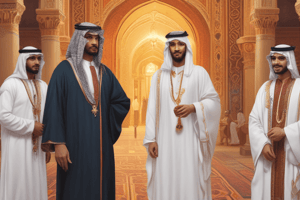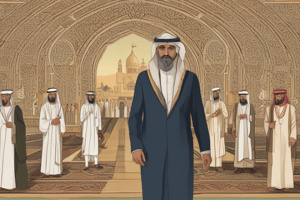Podcast
Questions and Answers
What type of government system does Burundi have?
What type of government system does Burundi have?
republic
What was Burundi's ranking in the 2013 International Property Rights Index?
What was Burundi's ranking in the 2013 International Property Rights Index?
- 1st
- 50th
- Last (correct)
- 131st (correct)
Companies should prioritize intellectual property rights only when selling products domestically.
Companies should prioritize intellectual property rights only when selling products domestically.
False (B)
What does the Trade Related Aspects of Intellectual Property Rights (TRIPS) require?
What does the Trade Related Aspects of Intellectual Property Rights (TRIPS) require?
What involves holding a firm and its officers responsible when a product causes injury, death, or damage?
What involves holding a firm and its officers responsible when a product causes injury, death, or damage?
Liability laws are generally more extensive in less developed countries.
Liability laws are generally more extensive in less developed countries.
What factors influence market attractiveness in a country?
What factors influence market attractiveness in a country?
What type of economy is characterized as more attractive for doing business?
What type of economy is characterized as more attractive for doing business?
What does collectivism emphasize?
What does collectivism emphasize?
Who traced the roots of modern socialism?
Who traced the roots of modern socialism?
Which of the following forms of totalitarianism is characterized by political power monopolized by a party governing according to religious principles?
Which of the following forms of totalitarianism is characterized by political power monopolized by a party governing according to religious principles?
Which economic system is characterized by the government planning the production and price of goods?
Which economic system is characterized by the government planning the production and price of goods?
What is the primary role of law in a country's legal system?
What is the primary role of law in a country's legal system?
What is intellectual property?
What is intellectual property?
In a civil law system, contracts are typically detailed with all contingencies spelled out.
In a civil law system, contracts are typically detailed with all contingencies spelled out.
Match the following political systems to their descriptions:
Match the following political systems to their descriptions:
What effect does high levels of corruption have on a country's foreign direct investment?
What effect does high levels of corruption have on a country's foreign direct investment?
What is the most widely practiced theocratic law?
What is the most widely practiced theocratic law?
Flashcards are hidden until you start studying
Study Notes
National Differences in Political, Economic, and Legal Systems
- Economic Transformation in Vietnam: Transitioned from a centrally planned socialist economy to a market-oriented system since 1986, enhancing living standards and productivity while reducing state enterprise dominance to 40%.
- Complexities of International Business: International business involves diverse economic developments, cultures, educational backgrounds, and political economies, interrelating societal culture with political frameworks.
Political Systems
- Definition: Political systems refer to the governance structure of a nation, assessed by collectivism vs. individualism and democracy vs. totalitarianism.
- Collectivism: Prioritizes collective goals over individual freedoms, historically linked to socialism and rooted in Plato's philosophy. Advocated by Karl Marx for state ownership of productive resources.
- Individualism: Stresses personal freedom and self-expression rooted in Aristotle's philosophy, promoting free markets and democratic systems.
- Democracy vs. Totalitarianism: Democracy involves government by the populace, whereas totalitarianism denotes absolute control by one party or individual, leading to repression, censorship, and denied civil liberties.
- Four Forms of Totalitarianism:
- Communist: Achieves socialism through dictatorship.
- Theocratic: Governed by religious laws.
- Tribal: Power held by a political party representing a tribe.
- Right-Wing: Limits political freedom while allowing economic freedom.
Economic Systems
- Connection to Political Ideology: Economic systems are directly influenced by political ideologies, classified as market, command, or mixed economies.
- Market Economy: Operates on supply and demand, promoting competition and minimal government interference.
- Command Economy: Government plans and controls production and pricing, leading to inefficiency and lack of consumer focus.
- Mixed Economy: Combines elements of both market and command economies, with governments intervening in critical industries.
Legal Systems
- Definition: Legal systems consist of the rules governing behavior and processes for enforcement and grievance redress.
- Types of Legal Systems:
- Common Law: Based on traditions and precedents (e.g., USA).
- Civil Law: Founded on organized legal codes (e.g., Germany, Japan).
- Theocratic Law: Governed by religious doctrines.
- Contract Law Differences: Varying levels of detail in contracts exist between common and civil law systems, with international conventions like CISG facilitating business transactions.
Property Rights and Corruption
- Property Rights Importance: They define resource usage and economic incentives; threats arise from private and public actions, hindering investment and growth in corrupt environments.
- Foreign Corrupt Practices Act: U.S. law prohibiting bribery of foreign officials and requiring companies to maintain transparent financial records.
Intellectual Property Protection
- Intellectual Property Types: Includes patents, copyrights, and trademarks, which differ significantly in protection across countries.
- Global IP Enforcement Challenges: Despite international treaties, enforcement can be lax, particularly in certain regions like China and Thailand.
- Strategies for Protecting IP: Involves lobbying for better laws, legal action, and avoiding regions with poor protections.
Implications for Management Practice
- Understanding national differences aid in strategizing international operations, ensuring compliance with local political, economic, and legal norms, thereby enhancing business success.### Product Safety and Product Liability
- Product safety laws establish required safety standards for products.
- Product liability holds companies and their executives accountable for any injuries, deaths, or damages caused by their products.
- Liability laws tend to be less extensive in less developed countries.
- Companies face a decision between following home country standards or aligning with host country regulations.
Macro Environment Influences
- The political, economic, and legal systems of a country shape ethical considerations and impact international business operations.
- A country's attractiveness as a market or investment site is influenced by its political stability, economic conditions, and legal framework.
- Democratic nations with market economies, strong property rights, and low corruption levels are more appealing for business activities.
Chapter Summary Insights
- The chapter covers differences in the political systems of various countries.
- Examination of how economic systems vary across nations.
- Analysis of distinctions in legal systems among countries.
- Implications of national differences in political economy for management practices are discussed.
Studying That Suits You
Use AI to generate personalized quizzes and flashcards to suit your learning preferences.




